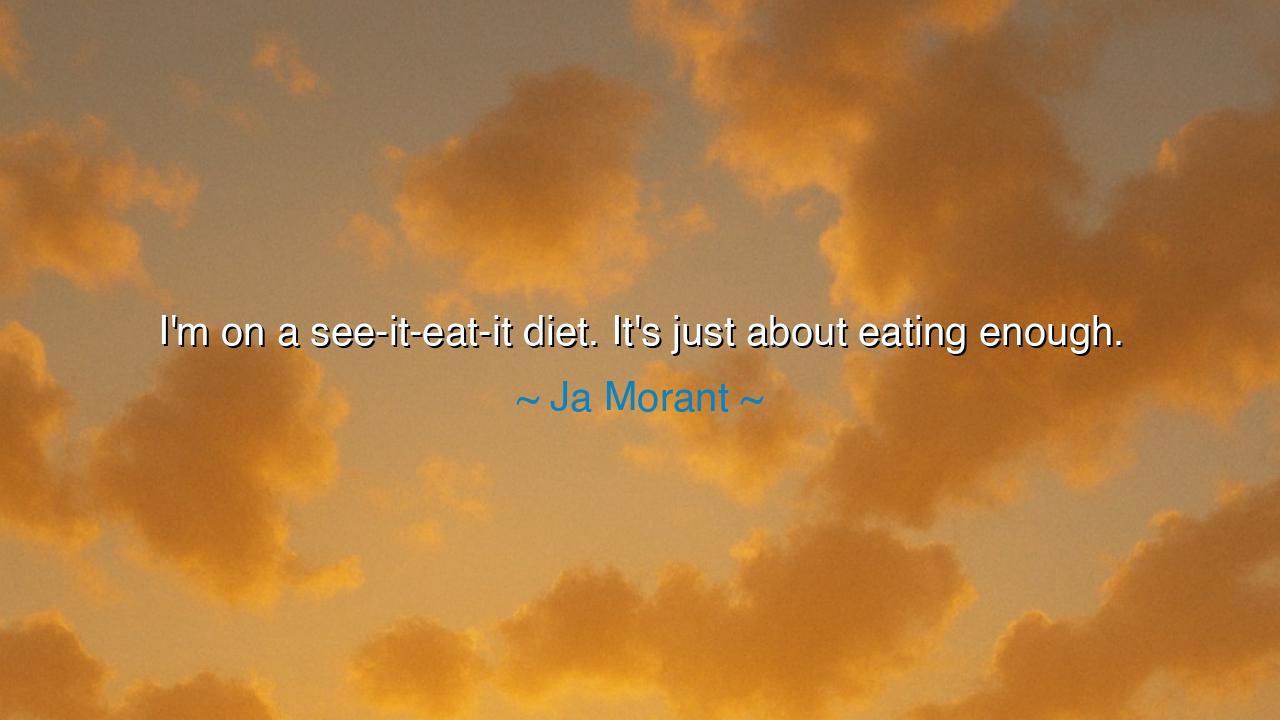
I'm on a see-it-eat-it diet. It's just about eating enough.






"I'm on a see-it-eat-it diet. It's just about eating enough." These words, spoken by Ja Morant, speak to the essence of balance and the importance of nourishment—not just for the body, but for the soul. In a world where dieting has often become synonymous with restriction, deprivation, and unattainable ideals, Morant offers a refreshing approach. His diet, simple yet profound, calls us to focus not on extremes but on the fundamental need to nourish ourselves properly. This statement reflects a deep understanding that the body, like any vessel, requires adequate sustenance to thrive.
In the ancient world, the great philosophers and thinkers also recognized the importance of balance in all things, especially when it came to the body and its needs. Hippocrates, the father of medicine, taught that food is the foundation of good health, and that to maintain vitality, one must practice moderation in all things. The very idea that nourishment should be about sufficiency, rather than excess or deprivation, is at the core of what Morant conveys. Just as a warrior must ensure that his body is strong and capable for battle, so too must we ensure that we are adequately prepared for the trials of our own lives. The art of eating enough, not too little or too much, is as ancient as the wisdom of the Greek philosophers.
Consider the story of Alexander the Great, the great conqueror who was known for his legendary military prowess. As he traveled through vast lands, from Greece to India, Alexander’s diet, like that of his soldiers, was simple and focused on sustenance rather than indulgence. His strength did not come from the luxuries of the courts or from excess, but from the practicality of eating enough to maintain the energy necessary for his campaigns. In times of hardship, his soldiers, like him, focused on survival through nourishment, eating only what was necessary to fuel them for the battles ahead. Alexander’s wisdom lay not in seeking abundance, but in recognizing the importance of sufficient sustenance for survival.
Morant’s words also reflect a deeper truth: clarity in purpose. For a person who is dedicated to their craft—whether that be in the athletic arena, in the field of artistry, or in any profession—the focus must be on the goal, not the distractions. A man or woman on a see-it-eat-it diet is not obsessed with the complexity of food choices or the social pressure to conform to unrealistic standards. Instead, they simply choose what is necessary to maintain strength and clarity, much like the warrior who focuses not on the feast, but on the task ahead. To eat enough is not to indulge, but to prepare oneself for the journey that lies ahead. This is the path of wisdom.
In times of old, such as during the Roman Empire, warriors and citizens alike were encouraged to nourish themselves for the demands of battle, not for pleasure or indulgence. The Roman general Julius Caesar, whose mind and body were equally sharp, often advocated for a simple diet that fueled his military strategy. In one particular campaign, Caesar’s legions were often fed simple but nutritious meals—bread, legumes, and fruits—that kept them strong for long marches. Caesar’s insight was not in feeding his army to excess, but in making sure that each soldier was well-fed, prepared, and capable of enduring the hardships of war. Morant’s words echo this wisdom, suggesting that the essence of nourishment lies not in extravagance, but in adequate sustenance.
In the context of our modern lives, Morant's approach to diet offers an important lesson: the pursuit of health is not about extremes. It is not about being obsessed with food or constantly depriving ourselves. It is about finding a healthy balance, where the body is neither underfed nor overburdened. By adopting the see-it-eat-it approach, we learn to listen to our bodies and feed them what they truly need. This speaks to a greater truth about life itself: that we must not be consumed by the pursuit of perfection, but instead honor our bodies with simple, thoughtful nourishment.
In this, we see a powerful call to action. Let us stop seeking the elusive perfection of extreme diets or following trends that leave us hungry, both physically and spiritually. Instead, let us focus on nourishment, not just in food, but in all areas of life. Eat enough, work enough, love enough—embrace a life that is centered in balance and clarity. Whether we are athletes, artists, or philosophers, we must understand that the true path to greatness is not through deprivation, but through maintaining the right amount of strength and energy to pursue our purpose. Morant’s wisdom is timeless: nourish the body, fuel the mind, and walk the path of life with the vitality that comes from being properly fed.






AAdministratorAdministrator
Welcome, honored guests. Please leave a comment, we will respond soon